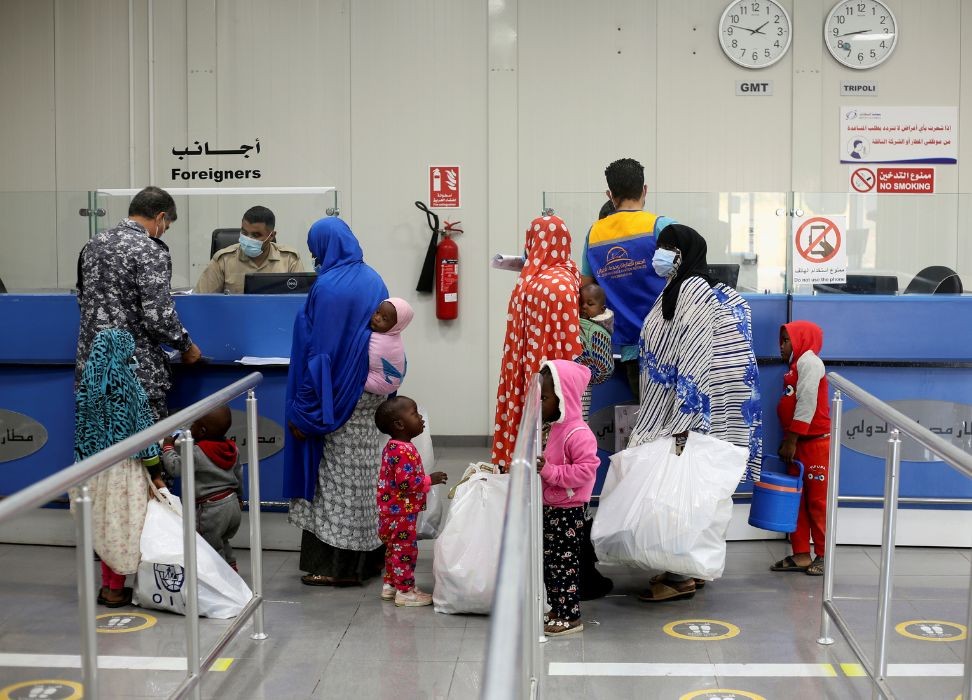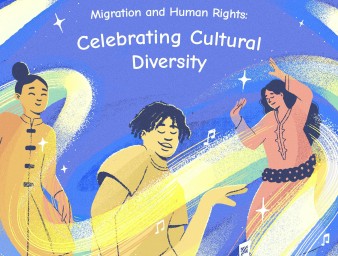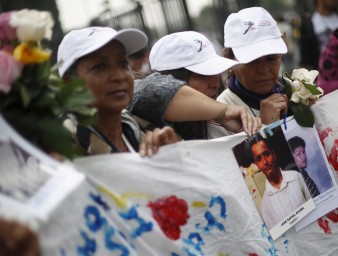Nowhere But Back: migrants in Libya compelled to accept ‘voluntary’ return
02 November 2022

“They brought me to a prison. But even at that point I didn’t think about going back. Then they entered the prison with a stick and were beating people like animals. Sometimes they would take your money and good clothes. They broke my teeth. So I accepted return,” said Lamin*, a migrant detained in Libya who was returned to his country of origin, The Gambia.
Lamin’s story is not an isolated case.
Since 2015, more than 60,000 migrants in Libya have been repatriated to different countries of origin across Africa and Asia through assisted return programmes, including at least 3,300 Gambians.
A new report of the UN Human Rights Office, Nowhere but back: Assisted return, reintegration and the human rights protection of migrants in Libya, analyses the human rights protection gaps in the context of assisted returns from Libya.
This report is part of a wider project by UN Human Rights to document and shed light on human rights violations and abuses faced by migrants in Libya. It builds upon and complements previous UN Human Rights reports, including Lethal Disregard, A Pandemic of Exclusion, and Unsafe and Undignified.
In launching the report, Deputy UN High Commissioner for Human Rights Nada Al-Nashif called on Libya to immediately end violations against migrants and urged all States to step up and increase access to pathways for safe and regular migration for migrants trapped in Libya.
“This desperate situation requires all concerned to ensure that no migrant is compelled to accept assisted return to an unsafe or unsustainable situation in their country of origin,” Al-Nashif added.
Compelled to return
While ‘assisted returns’ of migrants to their countries of origin are, in principle, voluntary, the report’s main finding is that many migrants in Libya are compelled to accept assisted returns in conditions that do not meet international human rights laws and standards.
In particular, many of the assisted returns carried out from Libya may not be truly voluntary due to the lack of free, prior and informed consent.
“I did not decide to come back. I was arrested at sea and taken to prison. In that prison, UN officials came and took my information, and from that prison I was deported to the Gambia. (…) They didn’t give me any information about the return. I just knew they were deporting me. I wasn’t told what I was signing—I didn’t know,” said Ebrima*, one of the 65 migrants interviewed by the UN Human Rights Office who had recently been returned to The Gambia and whose testimony is included in the report.
The report also found that migrants are frequently compelled to accept assisted return to escape an environment of impunity, abusive detention conditions, threats of torture, ill-treatment, sexual violence, enforced disappearance, extortion, and other human rights violations and abuses. The Independent Fact Finding Mission on Libya has found the situation of migrants in Libya to be a human rights crisis indicative of crimes against humanity.
“Once in Libya, migrants risk being systematically and routinely subject to criminalization, marginalization, racism and xenophobia, and face a wide range of human rights violations and abuses by both State and non-State actors,” the report warns. At the same time, there are virtually no safe and regular pathways for admission to and stay in third countries for migrants trapped in Libya.
“I was forced to work for few months [while I was] in a detention centre in Tripoli,” said Omar*, one of the migrants interviewed for the report. “When I refused to work because of exhaustion, I was beaten until I asked to be taken back to work. I [was taken outside where I] cleaned roads and houses, worked in farms and was never paid. I had little food and no potable water. When they offered me to return, I agreed. I wanted to stop the beating and the tough work.”
As a result, many migrants find they have no choice but to return to the same circumstances that made them leave their countries in the first place.
Back to phase zero…or worse
The report found that many migrants in Libya are being returned to the same unsustainable conditions that may have compelled them to migrate in the first place, such as extreme poverty, persistent food insecurity, including as a result of the adverse effects of climate change, lack of access to decent work, health and education, family separation, poor living standards and denial of the right to development. This comes in addition to facing additional personal, financial and psychosocial burdens as a result of their failed migration project and the severe trauma they experienced in Libya.
“I have lost all the money my family collected to pay my journey and then the prison guards (…) I was beaten and lost one eye in a prison. Now, I am back to ‘phase zero’ with only debts and nightmares,” said Momodou*, another interviewee. The migrants also testified they did not have opportunities to seek justice and redress for the human rights abuses and violations they have suffered.
Many face significant difficulties integrating into their countries and communities of origin and contemplate re-migrating, despite knowing the risks and precarious conditions they are likely to face.
The report calls on Libyan authorities, countries of origin, the African Union, the European Union, United Nations entities and other relevant stakeholders to ensure that assisted return policies and practices are consistent with and uphold international law and standards, including the principle of free, prior and informed consent and that returnees are provided with sufficient support to sustainably reintegrate in their home countries, in full respect of their human rights.
* NAMES HAVE BEEN CHANGED TO PROTECT IDENTITIES OF INTERVIEWEES



